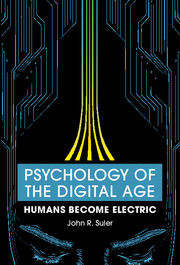Book contents
- Frontmatter
- Dedication
- Contents
- List of Figures
- Foreword
- Preface
- Acknowledgments
- Introduction: Newborns in Evolution
- 1 Cyberpsychology Architecture
- 2 Presence: Be Here Now
- 3 The Dynamic Digital Psyche
- 4 The Disinhibited Self
- 5 Electrified Relationships
- 6 Other Than You Think: Interpersonal Perceptions
- 7 Text Talk
- 8 Image Talk
- 9 I, Avatar
- 10 One of Us: Groups and Communities
- 11 Change and Excess
- 12 Addicted or Devoted
- 13 The Digital Deviant
- 14 Synthesized Realities and Synthesized Beings
- 15 Electric Th erapeutics
- Conclusion: Research and the Researcher
- References
- Index
3 - The Dynamic Digital Psyche
Published online by Cambridge University Press: 05 November 2015
- Frontmatter
- Dedication
- Contents
- List of Figures
- Foreword
- Preface
- Acknowledgments
- Introduction: Newborns in Evolution
- 1 Cyberpsychology Architecture
- 2 Presence: Be Here Now
- 3 The Dynamic Digital Psyche
- 4 The Disinhibited Self
- 5 Electrified Relationships
- 6 Other Than You Think: Interpersonal Perceptions
- 7 Text Talk
- 8 Image Talk
- 9 I, Avatar
- 10 One of Us: Groups and Communities
- 11 Change and Excess
- 12 Addicted or Devoted
- 13 The Digital Deviant
- 14 Synthesized Realities and Synthesized Beings
- 15 Electric Th erapeutics
- Conclusion: Research and the Researcher
- References
- Index
Summary
We know what we are, but not what we may be.
– William ShakespeareYears ago, when I was writing a book on psychoanalysis and Eastern thought, I struggled with the question that has long troubled psychologists: What is this thing called “self”? Back then, the information superhighway known as the Internet was still brand new. If cyberspace marked the next stage in the evolution of the human mind and self, then why not consult it about this question? So I fired up the computer, aimed my browser at the Alta Vista search engine, and entered the keyword “self.” After furiously scanning all of cyberspace, the engine came back with a reply: 2.5 million hits! Looks like the self is everywhere! Maybe that meant something. Or maybe I just needed to narrow my search. So I entered the keywords “true self.” This time I got 11,000 hits. Better. I was on the right track. How about “essence of self”? The search engine hummed away and returned 245 hits. Now I was definitely zooming in on the target. I could tell this was the right path because a lot of the hits included websites devoted to philosophy, spirituality, and poetry – although it also turned up the American Legion Magazine and a webpage called “Understanding Diarrhea in Travelers.” Maybe that was significant. After all, when asked what is the Buddha, a great Zen master once replied, “Dried turd.” Or maybe anomalous search engine results meant that the hunt for the self leads to glitches and dead ends. But I wasn't going to let that stop me. Finally, I entered in the keywords “the true and essential Self.” Once again Alta Vista went out into the vast Netherland of global electronified knowledge and came back with … zero hits. Nothing! The void! The True and Essential Self was nowhere to be found – well, at least not in cyberspace.
WHO ARE YOU?
Who are you in cyberspace? This is the key question in the identity dimension of cyberpsychology architecture. Are you the same person as you are in the real world? One of the most fascinating aspects of the Internet is the opportunity it offers people to present their identities in a variety of forms.
- Type
- Chapter
- Information
- Psychology of the Digital AgeHumans Become Electric, pp. 68 - 94Publisher: Cambridge University PressPrint publication year: 2015



